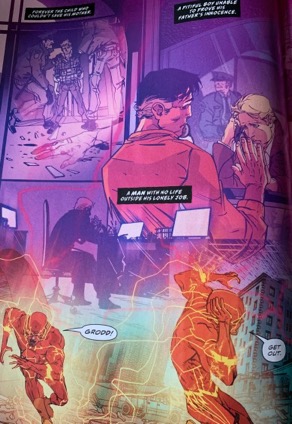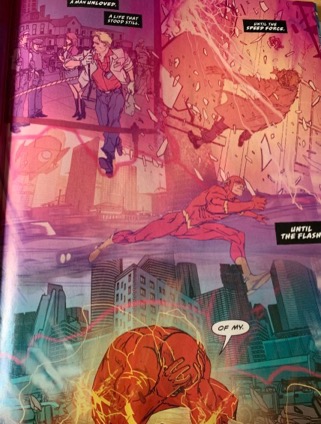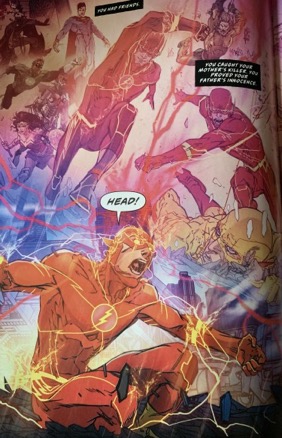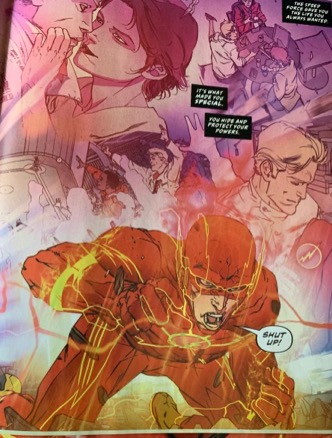Flash Loses the Speed Force
30/04/20 11:33
Lately, I’ve been spending my time writing about Superman, reading about Flash, and thinking about Wonder Woman while continuing to read and educate myself further on the nature of trauma and healing. In the process of reading, writing, and wonder, I have consistently returned to the same question: what obstacles are standing in the way for male survivors to heal?
To alleviate these obstacles, I moved from strictly memoir writing to a self-help format that males can easily relate to in order to make healing possible while also being entertaining and connecting to a character they know and love. Although I know my writing and speaking on a sensitive topic such as childhood sexual abuse has helped many other survivors to begin the process of recovery, my thoughts can sometimes become negative. As a male survivor myself, staying positive while also practicing self-care is a full-time job on top of my other full-time jobs. So, believing that I am making any difference as book sales stagnate, good hearted celebrities continuously spout the belief that men and boys cannot be raped, and online advertisement comments for my books consist of jokes about my name or the how “hypervigilance is a good thing” rather than healing to become a complete person, was becoming difficult. I began to question whether or not men want to heal at all, or do they just want to remain bruised and broken, pushing those they care about further and further away. I know this is not true, but I could not find a more valid answer to the growth and perpetuation of toxic masculinity throughout our society until this morning.
While sitting in my daughter’s room reading Flash #41: “The Perfect Storm: Part Three” (2018) as she put together a Paw Patrol puzzle, something Barry said made clicked. In this six-part series, Grodd has stripped Barry of his connection to the Speed Force, taking his title as Flash in the process. However, before stripping Barry of his superpowers, Gordd says to Barry in Flash #40 by projecting thoughts into the hero’s mind:


Your mind moves so fast that controlling you is a challenge, Flash. But I can still gaze deep into your mind. To your darkest secret. The one that you keep from your family and friends! Who you really are. Forever the child who couldn’t save his mother. A pitiful boy unable to prove his father’s innocence. A man with no life outside his lonely job. A man unloved. A life that stood still. Until the Speed Force. Until the Flash! You had friends. You caught your mother’s killer. You proved your father’s innocence. You had it all. It’s what made you special. You hide and protect your powers. The Speed Force gave you the life you always wanted. Because you know in your heart that without them you would be nothing.


Later, without his powers, and on his way to release the villain, Godspeed from the prison Iron Heights, in the hope that he can help restore his powers using a lighting wand, Barry thinks to himself:
Wally didn’t know me until after I was the Flash. No one did. And I don’t want him to ever meet that version of me. The one from before the powers. Every time I’ve had to break into Iron Heights I’ve hated it. But I’m desperate. Without my powers, I’m just as broken as the wand.
After reading these lines, I began to think of Judith Lewis Herman, M.D.’s book Trauma and Recoveryand what she says healing truly means. She explains that once an individual moves down the path of recovery, “the survivor must be ready to relinquish the ‘specialness’ of her identity.” Herman goes on to explain:
Commonality with other people carries with it all the meanings of the word common.It means belonging to a society, having a public role, being part of that which is universal. It means have a feeling of familiarity, of being known, of communion. It means taking part in the customary, the commonplace, the ordinary, and the everyday. It also carries with it a feeling of smallness, of insignificance, a sense that one’s own troubles are “as a drop of rain in the sea.” The survivor who has achieved commonality with others can rest from her labors. Her recovery is accomplished. All that remains before her is her life.
What Judith Herman is explaining in these lines is that survivors who continue to heal and recover from past trauma eventually realize that they are not alone in their trauma. Through interactions, and a rejoining of society they see that so many others have been hurt in similar ways, if not worse. Coming to this realization means no longer feeling the strength associated with believing they are unique, special, or different, but the same as everyone else.
Please, don’t misunderstand what I am attempting to explain. I am not saying that the trauma of sexual abuse and assault is viewed as a good thing in the mind of a survivor. What I am saying is that when an individual suffers the trauma of being sexually abused their power is taken away. They feel weak, and no longer in control of their life, body, or thoughts. However, over time a survivor may come to believe that their sexual abuse, assault, or trauma, is the only thing that makes them special. While the sexual abuse / assault stripped them of their power, overtime that same sexual abuse / assault makes a survivor feel entitled to think, behave, and act in ways that are hurtful to themselves and others. The trauma becomes a source of power for the survivor, but in a negative way. Sort of like the Negative Speed Force. This way of thinking transforms the thoughts of a survivor to those of a victim and can be seen in the thoughts and actions of Barry.
Barry never truly healed from his childhood trauma. Instead, he was bestowed with the power of the Speed Force, making him the Flash. Before his abilities, he believed he was worthless. After receiving his abilities, these thoughts did not go away. They remained locked deep within his mind, making him believe that without his connection to the Speed Force, he will lose the life he has built. So, after losing his powers to Grodd, Barry felt as if he were nothing, quickly performing actions that resembles those of a villain in order to regain his feelings of being “unique” by becoming Flash once again.
In many cases, male survivors who do not want to heal from the trauma of their childhood sexual abuse believe that if they do, they will lose what makes them “unique”. They believe they will lose their “special abilities” that saved them as a “hypervigilant” child. They believe that without the skills they developed as a result of their childhood trauma they are nothing, and everyone will see how worthless they are. This is not true for Barry Allen, or other male survivors who are afraid to heal. Just as Barry’s connection to the Speed Force is not what makes him a hero, a survivor’s trauma is not the sum of their worth. Barry still had a loving father, and worked to become a great CSI detective for Central City. His abilities are also not what made others view him as a friend, leader, and lover. As a male survivor, the people closest to you do not love you for your ability to remain hypervigilant, or seek perfectionism throughout all aspects of your life. They love and care for you, for who are.
Choosing to heal is a difficult decision that requires a lot of work, bravery, and courage. Those of you who choose to make this choice are not choosing to become weak. Instead, you are choosing to develop abilities you never knew you had to become stronger than you ever imagined possible. Do not be afraid. If you chose to heal you are still a “real” man. The only difference is that now you’re also becoming a “better” man.
To alleviate these obstacles, I moved from strictly memoir writing to a self-help format that males can easily relate to in order to make healing possible while also being entertaining and connecting to a character they know and love. Although I know my writing and speaking on a sensitive topic such as childhood sexual abuse has helped many other survivors to begin the process of recovery, my thoughts can sometimes become negative. As a male survivor myself, staying positive while also practicing self-care is a full-time job on top of my other full-time jobs. So, believing that I am making any difference as book sales stagnate, good hearted celebrities continuously spout the belief that men and boys cannot be raped, and online advertisement comments for my books consist of jokes about my name or the how “hypervigilance is a good thing” rather than healing to become a complete person, was becoming difficult. I began to question whether or not men want to heal at all, or do they just want to remain bruised and broken, pushing those they care about further and further away. I know this is not true, but I could not find a more valid answer to the growth and perpetuation of toxic masculinity throughout our society until this morning.
While sitting in my daughter’s room reading Flash #41: “The Perfect Storm: Part Three” (2018) as she put together a Paw Patrol puzzle, something Barry said made clicked. In this six-part series, Grodd has stripped Barry of his connection to the Speed Force, taking his title as Flash in the process. However, before stripping Barry of his superpowers, Gordd says to Barry in Flash #40 by projecting thoughts into the hero’s mind:


Your mind moves so fast that controlling you is a challenge, Flash. But I can still gaze deep into your mind. To your darkest secret. The one that you keep from your family and friends! Who you really are. Forever the child who couldn’t save his mother. A pitiful boy unable to prove his father’s innocence. A man with no life outside his lonely job. A man unloved. A life that stood still. Until the Speed Force. Until the Flash! You had friends. You caught your mother’s killer. You proved your father’s innocence. You had it all. It’s what made you special. You hide and protect your powers. The Speed Force gave you the life you always wanted. Because you know in your heart that without them you would be nothing.


Later, without his powers, and on his way to release the villain, Godspeed from the prison Iron Heights, in the hope that he can help restore his powers using a lighting wand, Barry thinks to himself:
Wally didn’t know me until after I was the Flash. No one did. And I don’t want him to ever meet that version of me. The one from before the powers. Every time I’ve had to break into Iron Heights I’ve hated it. But I’m desperate. Without my powers, I’m just as broken as the wand.
After reading these lines, I began to think of Judith Lewis Herman, M.D.’s book Trauma and Recoveryand what she says healing truly means. She explains that once an individual moves down the path of recovery, “the survivor must be ready to relinquish the ‘specialness’ of her identity.” Herman goes on to explain:
Commonality with other people carries with it all the meanings of the word common.It means belonging to a society, having a public role, being part of that which is universal. It means have a feeling of familiarity, of being known, of communion. It means taking part in the customary, the commonplace, the ordinary, and the everyday. It also carries with it a feeling of smallness, of insignificance, a sense that one’s own troubles are “as a drop of rain in the sea.” The survivor who has achieved commonality with others can rest from her labors. Her recovery is accomplished. All that remains before her is her life.
What Judith Herman is explaining in these lines is that survivors who continue to heal and recover from past trauma eventually realize that they are not alone in their trauma. Through interactions, and a rejoining of society they see that so many others have been hurt in similar ways, if not worse. Coming to this realization means no longer feeling the strength associated with believing they are unique, special, or different, but the same as everyone else.
Please, don’t misunderstand what I am attempting to explain. I am not saying that the trauma of sexual abuse and assault is viewed as a good thing in the mind of a survivor. What I am saying is that when an individual suffers the trauma of being sexually abused their power is taken away. They feel weak, and no longer in control of their life, body, or thoughts. However, over time a survivor may come to believe that their sexual abuse, assault, or trauma, is the only thing that makes them special. While the sexual abuse / assault stripped them of their power, overtime that same sexual abuse / assault makes a survivor feel entitled to think, behave, and act in ways that are hurtful to themselves and others. The trauma becomes a source of power for the survivor, but in a negative way. Sort of like the Negative Speed Force. This way of thinking transforms the thoughts of a survivor to those of a victim and can be seen in the thoughts and actions of Barry.
Barry never truly healed from his childhood trauma. Instead, he was bestowed with the power of the Speed Force, making him the Flash. Before his abilities, he believed he was worthless. After receiving his abilities, these thoughts did not go away. They remained locked deep within his mind, making him believe that without his connection to the Speed Force, he will lose the life he has built. So, after losing his powers to Grodd, Barry felt as if he were nothing, quickly performing actions that resembles those of a villain in order to regain his feelings of being “unique” by becoming Flash once again.
In many cases, male survivors who do not want to heal from the trauma of their childhood sexual abuse believe that if they do, they will lose what makes them “unique”. They believe they will lose their “special abilities” that saved them as a “hypervigilant” child. They believe that without the skills they developed as a result of their childhood trauma they are nothing, and everyone will see how worthless they are. This is not true for Barry Allen, or other male survivors who are afraid to heal. Just as Barry’s connection to the Speed Force is not what makes him a hero, a survivor’s trauma is not the sum of their worth. Barry still had a loving father, and worked to become a great CSI detective for Central City. His abilities are also not what made others view him as a friend, leader, and lover. As a male survivor, the people closest to you do not love you for your ability to remain hypervigilant, or seek perfectionism throughout all aspects of your life. They love and care for you, for who are.
Choosing to heal is a difficult decision that requires a lot of work, bravery, and courage. Those of you who choose to make this choice are not choosing to become weak. Instead, you are choosing to develop abilities you never knew you had to become stronger than you ever imagined possible. Do not be afraid. If you chose to heal you are still a “real” man. The only difference is that now you’re also becoming a “better” man.